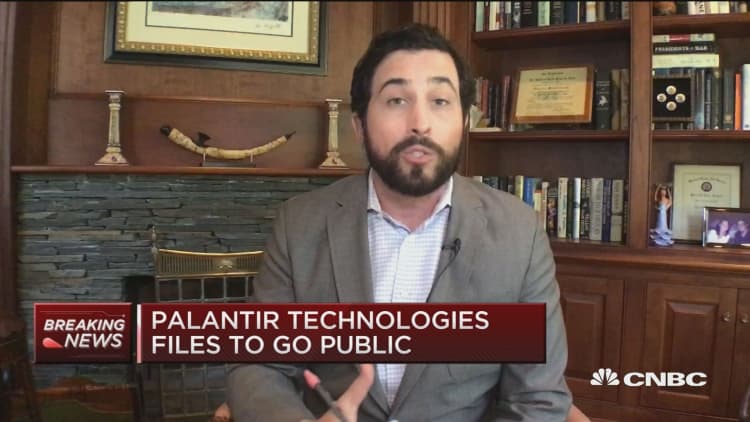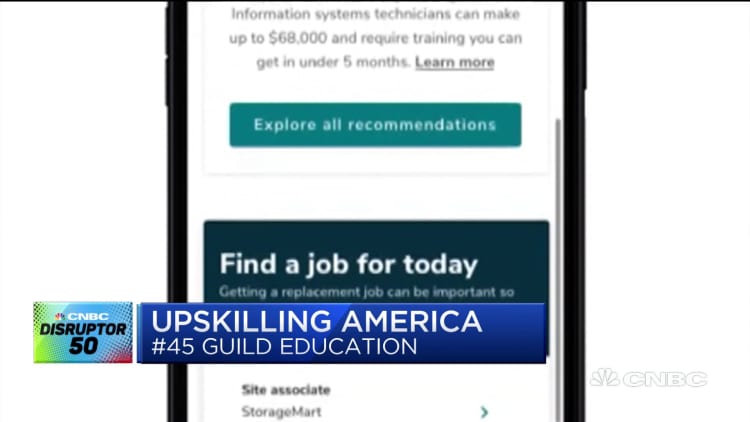Last week we learned that data analytics software company Palantir plans to relocate from Palo Alto to Colorado after officially listing Denver as its headquarters on the company website. The news shocked few who have long followed CEO Alex Karp's sharp criticism of Silicon Valley.
After officially filing to go public and list on the NYSE yesterday, Karp defended his posture in a letter to investors, saying "the engineering elite" of Silicon Valley do not know "how society should be organized or what justice requires," adding that though the company was founded in the Valley, "we seem to share fewer and fewer of the technology sectors values and commitments."

Of course, Palantir's decision to relocate also comes as the United States continues to grapple with the Covid-19 pandemic. For years there's been talk of a Bay Area exodus due to its increasingly steep cost of living — but amid the pandemic, this year has shown that the freedom to work anywhere is a real reckoning for America's most coveted innovators, despite their ability to attract top talent. Last month, Google-parent Alphabet, as well as Facebook, made headlines by allowing their employees to work remotely until June and July of 2021, respectively, while San Francisco-based Twitter and Slack have said that workers can "work from anywhere" indefinitely.
"A lot of things can be done remotely and in the proximity of being near the San Francisco Bay Area, near Boston ... you don't need to be there every single day. And so digitally, we connect really easy because we're right in the middle of the U.S.," says J.J. Ament, CEO of the Metro Denver Economic Development Corporation, adding that their digital connection is well balanced with the "physical connection" that Denver's location offers when business needs to be done face-to-face and traveling is required.
Given that the return to travel has been largely driven by domestic demand, Denver International Airport has seen the smallest capacity cuts of any U.S. airport by United Airlines, Southwest Airlines and Frontier Airlines, while also ranking first for TSA throughput for the past seven weeks straight. "We're about the only place you can hit Germany and Japan with just one bounce off a satellite," Ament added.
Location, location, location
Though each are California-based, Google, Facebook and Slack each have additional offices in Denver, while Twitter expanded into nearby Boulder, Colorado back in 2017. And while some believe it's still early days, moves from big corporations such as these four have many workers thinking longer term about the necessity of living in expensive metropolitan areas like San Francisco and New York City, among others.
According to Zillow, homes in Denver, Phoenix and Austin have been selling at accelerated rates in recent months. The company reports that the median list price of homes was up 6.6% for the year ending August 1, while in San Francisco, list prices were down 5%.
"The thing is mortgage rates are so low, and housing is so cheap, outside the Bay Area that you can basically take what would have been a down payment there and buy a house [elsewhere]," said Austen Allred, co-founder and CEO of online learning start-up Lambda School.
For rentals in the Denver metro area, the Covid-19 pandemic brought years of apartment development and economic expansion to a halt. But despite a mild depression, many developers agree that the city is going to remain a place that people want to live, and are planning future construction accordingly. In fact, Apartment Insights counts 22,000 apartments currently under construction in the Denver area with 40,000 in the planning pipeline.
"I would tell you we are still incredibly bullish on Denver in the long term," Sam Kasparek, managing partner of Kairoi Residential, told the Denver Post last month. "Now that you have the flexibility to work from anywhere, I think a lot of people are going to choose Denver. It's a lot more affordable than some of those coastal markets, and it's got a great lifestyle."
"We're about the only place you can hit Germany and Japan with just one bounce off a satellite."J.J. AmentCEO, Metro Denver Economic Development Corporation
While Palantir employs roughly 2,500 people worldwide, it should come as no surprise that the 350 to 400 workers based at the company's Palo Alto headquarters are likely among those considering alternative areas of residence. The average cost of a house there is now $2.75 million, according to Redfin. By comparison, Palo Alto broker Zane MacGregor reports that's now $1.75 million more than the median cost of a house in 2004 when Palantir was founded.
The average cost of a house in Denver today? $460,000.
Meanwhile, office rent comes at about a third the cost in Denver compared to San Francisco, and the corporate tax rate in Colorado is 4.6% — nearly half that of California. Modest numbers like those were particularly attractive to Wix, an Israeli based website platform that's currently searching for an office location in downtown Denver. The company recently announced that it plans to hire 200 people in the area by the end of this year. Similarly, Marqeta, ranked No. 33 on this year's CNBC Disruptor 50 list, announced in June that it plans to launch their second headquarters in Denver, which was incentivized by a job growth tax credit of $5.5 million after the fintech company said that it plans to employ 500 people, hiring 100 over the next eight years. According to the Denver Post, state officials said that the average annual wage of these new jobs is $134,472.
"I don't know that I've talked to a single CEO who plans on keeping things the way they were," said Allred, whose company is based in San Francisco. "I talk regularly with most of the CEOs of the biggest companies in San Francisco, and outside of maybe Salesforce, nobody's said we plan on keeping everybody in San Francisco."
From Silicon Valley to the Silicon Mountains
Like Karp, Palantir Co-founder Peter Thiel has long believed that Silicon Valley isn't an ideal place for start-up employees to work and live. It was seven years ago when Thiel explained his reasoning to The Wall Street Journal:
"Let me give a Silicon Valley — and New York City — focused answer. We have to figure out ways to make housing more affordable in these places. When people start companies they are typically getting paid in equity and not a large salary. The way rent and housing costs have gone through the roof in a number of cities where people go to start companies is a tremendous problem," he said.
Karp echoed this sentiment last May in an interview with Axios where he drew a notable line in the sand, saying that he was against the "increasing tolerance and monoculture of Silicon Valley," and at the time, was nearing a decision to move Palantir to a number of cities that included Denver.

As Karp relocates Palantir headquarters, there's a growing concern that the "monoculture" of Silicon Valley he then spoke about, could eventually present itself in areas like Denver that are growing in popularity among tech companies. Ament says that the biggest risk they face in Denver is not being able to limit "the disparities between the have's and the have not's."
But, according to Brookings, Denver is the only metro region in the country that improved prosperity from 2007 to 2017, and boasts "a growing, dynamic economy that boosted wages and standards of living, drew more people into the labor market, reduced poverty, and narrowed disparities by race and ethnicity."
"Frankly, one of the things we've been able to benefit from is watching what's happened in Seattle; Watching what's happened in the Bay Area, and being able to learn from some of those lessons," says Ament. "That said, there are still disparities between those who are really participating in the economy and those who are not fully engaged."
Some assert that Palantir's move to Denver is an attempt to cut costs and save cash ahead of its highly anticipated public debut. The release of yesterday's S-1 prospectus revealed a nearly $580 million net loss in 2019 on roughly $742 million in revenue. Rather than sell shares through an initial public offering, the company intends to debut with a direct listing, which is the same unconventional route taken by Slack in 2019 and Spotify in 2018.
"Their net margins are not great and I'd be thinking about cost reduction as well if I had similar numbers," said Allred. His company, Lambda School, has raised just over $129 million to date at an implied valuation of $150 million, according to PitchBook.
Their financials aside, Palantir's not the first company to eye the Rocky Mountains. Some high profile tech companies including Salesforce, Robinhood, and Datadog, also have offices in the Denver metro area, while younger companies like Guild Education, ranked No. 45 on this year's CNBC Disruptor 50 list, is headquartered there.
"When we were hiring our first group of employees at Guild in 2016, we knew we wanted to operate in a place where we could attract great tech talent," said Guild Education Co-founder and CEO Rachel Carlson. "As a Colorado native, I knew that the talent pool in Denver was equally strong to comparable cities."

A 2019 report from 24/7 Wall Street ranked both Denver and Boulder among the top 15 markets for STEM talent in the country. Additionally, the 2020 Scoring Tech Talent report from CBRE ranked Denver 7th in the nation in technology talent. Both marks are likely among the reasons that a heavy-hitter like Amazon announced last April that it would double its Denver workforce with an additional 400 roles on the ground.
In May, even Tesla CEO Elon Musk tweeted about the possibility of moving the electric carmaker out of California, following a suit against California's Alameda County, asserting that the county rules contradict state policy on business closures amid the pandemic. This caught the attention of Colorado Governor Jared Polis, who responded to the tweet encouraging Musk to choose Colorado for being "pro-business, [having] low taxes, pro-immigration, pro-LGBT, [and] globally-minded."
Musk, whose original tweet expressed interest in moving its "HQ and future programs to Texas/Nevada immediately," responded to Gov. Polis, praising Colorado and saying that the state's policies "make a lot of sense."
Following last month's earnings report, Tesla announced that it will build its newest Gigafactory on approximately 2,000 acres of land near Austin, Texas.
As a Colorado native, I knew that the talent pool in Denver was equally strong to comparable cities.Rachel CarlsonCo-founder and CEO, Guild Education
"If we were still back in 1980, Colorado's economy would have been decimated by the recession of today or even '08," Ament said. But much of the ongoing attraction to Denver, he believes, is also attributed to the state's ability to diversify the economy away from energy, tourism and agriculture alone, "the way it was in the 80s."
"I don't think there will be a full exodus of San Francisco for most companies, but I think if you're a company like Lambda School and you can hire a solid engineer in Denver for about half of what a solid engineer in San Francisco costs ... it's a no brainer," Allred said.
"But, if you're going to hire that person in San Francisco, you better be dang sure you need that person in San Francisco."






